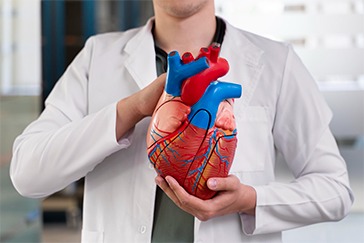 Book Appt.
Book Appt.
 Call Now
Call Now


Myocardial infarction, commonly known as a heart attack, is a life-threatening medical emergency that occurs when a portion of the heart muscle is deprived of oxygen-rich blood, leading to damage or death of heart tissue. It is a major health concern worldwide, as it can result in severe complications and even death if not promptly treated. Understanding the causes, symptoms, risk factors, and treatment of myocardial infarction is essential for prevention and early intervention.
Causes of Myocardial Infarction
A heart attack is usually caused by a sudden blockage of one or more coronary arteries, which supply the heart muscle with oxygenated blood. The blockage can occur due to:
Risk Factors
Several factors increase the risk of developing a heart attack, including:
Symptoms
Recognizing the symptoms of a heart attack is crucial for timely intervention. Common symptoms include:
Treatment
Timely treatment is essential to minimize heart muscle damage and improve the chances of survival. The main treatments for myocardial infarction include:
Conclusion
Myocardial infarction, or a heart attack, is a serious and life-threatening condition that demands prompt recognition and immediate medical attention. Understanding the causes, risk factors, symptoms, and available treatments is essential for prevention and early intervention. By managing risk factors, adopting a heart-healthy lifestyle, and seeking medical attention when necessary, individuals can reduce their chances of experiencing a heart attack and enjoy a healthier, longer life.
SHALBY Sanar International Hospitals provides extensive medical procedures backed up with our state-of-the-art technology and a team of highly qualified & experienced clinical experts.

Life-Changing TAVR Success Story | Dr. D.K. Jhamb | SHALBY Sanar International Hospitals

Timely Angiography Procedure Saves life of Iraqi Patient.

Rajiv Makhni, Managing Editor of NDTV, Shares His Experience at SHALBY Sanar International Hospitals

A successful treatment procedure helped Ms. Suri get over breathlessness
Our doctors pen down their research findings and experiences from time to time. Their words provide deep insight into the latest techniques, technologies and other advancements in healthcare. It provides expert answers to all kinds of health questions for real-life issues.
VIEW ALL




Since the day of its foundation, SHALBY Sanar International Hospitals is committed to provide comprehensive healthcare services. It regularly organizes awareness programs in its premises and encourages outdoor healthcare activities and camps with an intent to put focus on preventive healthcare.
VIEW ALL